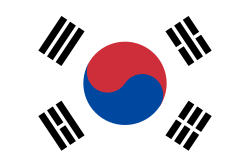| South Korea at the Asian Games | |
|---|---|
 | |
| IOC code | KOR |
| NOC | Korean Olympic Committee |
| Website | https://www.sports.or.kr/eng/index.do |
| Medals Ranked 3rd |
|
| Summer appearances | |
| Winter appearances | |
Republic of Korea has competed at every celebration of the Asian Games except the 1951 Asian Games, including hosting the Summer Games in 1986, 2002, and 2014 and the Winter Games in 1999.
Contents
- Asian Games
- Medals by Games
- Medals by sport
- Medals by individual
- Asian Winter Games
- Medals by Games 2
- Medals by sport 2
- East Asian Games
- Medals by Games 3
- Asian Indoor and Martial Arts Games
- Medals by Games 4
- Asian Beach Games
- Medals by Games 5
- Asian Youth Games
- Medals by Games 6
- Asian Para Games
- Medals by Games 7
- Asian Youth Para Games
- Medals by Games 8
- See also
- References
- External links
South Korean athletes have won a total of 2,235 medals at the Asian Games and have won a total of 249 medals at the Asian Winter Games, with short-track speed skating and speed skating as the main medal-producing sports. However, South Korea never finished at the top of the medal table of an Asian Games (the closest was in 1986 edition).